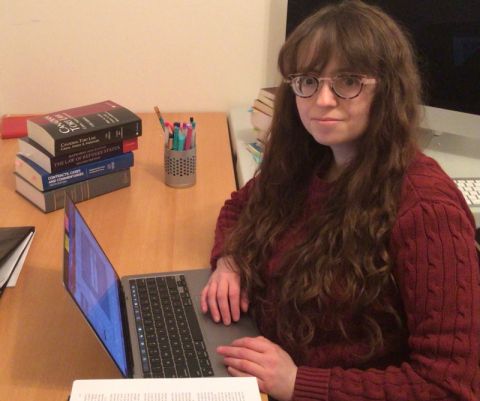
Marina Saporito, Law’23, spent last summer helping to educate Akwesasne community members about record suspensions, which allows those with criminal records to participate in their community’s independent Indigenous legal system. Interning with the Akwesasne Justice Department (AJD) that oversees the Akwesasne Court, the first court in Canada that operates under an independent Indigenous legal system.
“I learned about the history of creating the system and the various steps involved in having a community-led justice system,” she says. “Record suspensions allow for more community members to become involved in the justice system. I learned all about the process to get a record suspension and the important role it had for AJD’s justice system.”
With a newly established multi-step process for cannabis charges and changes to the record suspension eligibility waiting period, the AJD needed to educate the public. That’s where Saporito came in.
Focusing on creating educational tools for community members, she prepared an information pamphlet, gave two presentations, and oversaw another one. In a handbook she drafted for community members and leaders, she included the presentation, pamphlet, required forms, and additional information addressing common questions that were asked during her presentation. In addition, she helped develop training sessions on the common law system.
Working independently most of the time, Saporito honed her project management skills. “My internship marked one of the first times that I oversaw the completion of a project outside of my academics and I was excited about the challenge,” she says.
In addition to researching and drafting content for pamphlets on the record suspension process, she further developed her communication skills by making presentations to community members and speaking with external organizations to finalize the project. “I am participating in a competitive moot this year and these skills have been incredibly helpful as I navigated writing my memorial and practicing for oral submissions,” she notes.
It was during her first year of law school that Saporito first got involved with the AJD, volunteering with the Queen’s Chapter of Pro Bono Students Canada (PBSC). For her PBSC project, she outlined a lesson plan for an in-person session on appeals that was part of the curriculum for training the Justices of the Peace. “I was excited about the internship opportunity to continue to support AJD and their justice system,” she says. During her volunteer placement, she developed legal research skills, was mentored by upper-year students, and met her soon-to-be internship supervisor, Joyce King, AJD Director.
“Throughout my internship, I was fortunate to learn so much about the Akwesasne justice system and the importance of the work that Joyce and the AJD do,” Saporito says. “Working with the AJD reaffirmed my commitment to supporting Indigenous peoples and communities. I am excited to be taking Aboriginal Law with Hugo Choquette (Law’05, LLM’10, PhD’17) this term and am very excited for Professor Lindsay Borrows to join Queen’s Law in the summer.”
For Saporito, mentorship was also a key part of her internship experience. “My mentor, Joyce, was an invaluable resource of knowledge, feedback, and information throughout my internship,” she says. “Joyce always spoke from a position of uplifting others. In my own mentoring relationships since then, I have employed a similar perspective that she inspired.”
Saporito’s internship was part of the Debwewin Summer Law Program, which is organized by the Ontario Ministry of the Attorney General’s Indigenous Justice Division. Through the program, Queen’s Law and the Ministry provided her and two classmates with financial support so they could provide community education and legal assistance support to Indigenous communities and community organizations in the province.